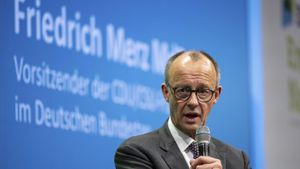President Donald Trump has initiated the appeals process for his conviction on 34 counts of felony falsifying business records, stemming from the infamous hush money payment to adult film actress Stormy Daniels during the 2016 election campaign. This legal move marks another chapter in the complicated relationship between politics and law for the former president, who has branded the case against him as politically motivated.
Now represented by the prominent law firm Sullivan & Cromwell, Trump filed his notice of appeal on January 10, 2025, right after receiving what is called an unconditional discharge—essentially sparing him from jail time, probation, or fines. His new attorney, Robert Giuffra, emphasized the importance of the appeal, stating, "The misuse of the criminal law by the Manhattan DA to target President Trump sets a dangerous precedent, and we look forward to the case being dismissed on appeal." This appeal will first be reviewed by New York's mid-level Appellate Division, and could eventually make its way to the State Court of Appeals.
The conviction, delivered by a Manhattan jury, arose from allegations alleging Trump concealed payments made to Daniels totaling $130,000, which he funneled through his former lawyer, Michael Cohen, under the guise of legal expenses. Prosecutors argued such actions constituted falsifying business records, as they were linked to efforts to hide the impact of the payment on Trump’s 2016 presidential campaign. Giuffra argued, "President Donald J. Trump’s appeal is important for the rule of law, New York’s reputation as a global business, financial and legal center, as well as for the presidency and all public officials." This highlights not only Trump's concerns but also the broader legal precedents at stake.
During his sentencing, Trump made headlines by denouncing the charges against him as unjust. He stated, "For this I got indicted. It’s incredible, actually," drawing attention to his framing of the legal challenges as politically motivated and part of what he terms as “a political witch hunt.” His narrative has remained consistent since trial procedures started, emphasizing his claim to maintain presidential integrity against what he views as government overreach.
Trump’s legal team, which includes Sullivan & Cromwell partners such as James McDonald and Morgan Ratner, is expected to file more detailed legal arguments over the next few months. It is unclear precisely what avenues they will pursue—whether they will argue based on presidential immunity, the interpretation of falsifying records, or other legal defenses. Yet, they will be pitted against the sharp legal minds from the Manhattan District Attorney's office, headed by Alvin Bragg’s team, who successfully prosecuted the case initially.
This trial was significant, marking the first time a sitting president was convicted of crimes related to his conduct before and during his presidency. Some critics say this conviction, being highly publicized, could denote the altering of norms around political figures and legal accountability. Trump's attorneys assert mislabeling payments to his lawyer wasn’t illegal but rather legitimate legal fees, claiming personal motivations—protection of his family—were at play rather than campaign tactics. This distinction plays directly to their argument about the nuances of intent behind the timing and nature of the payments to Cohen, arguing it should not amount to legal charges.
With the appeal process just beginning, the case signifies more than Trump's personal battle with the legal system; it sets the stage for broader discussions on the intersection of law and politics. Critics of the Manhattan DA and legal system argue this case could chill the actions of future politicians, especially as they weigh legal strategies for dealing with personal scandals, including how they finance campaign-related issues.
On the other hand, supporters of the conviction see it as landmark accountability for political leaders who strive to live outside the boundaries of law and ethical practice. The duality of opinions surrounding the case reflects the polarizing nature of Trump himself and the legal arguments raised. Their discourse will only heighten as the appeals process advances and the courts begin to offer more substantial responses to the arguments laid out by both sides.
The 2024 appeals process and any resultant rulings may have monumental effects not only on Trump's political future as he seems poised for another presidential run but could impact how public officials manage their responsibilities and accountability before the rule of law. The outcome will be pivotal not only for Trump but for upcoming governance and political landscapes, raising salient questions about ethical conduct among electoral candidates and the ramifications of legal findings on future campaigns.



